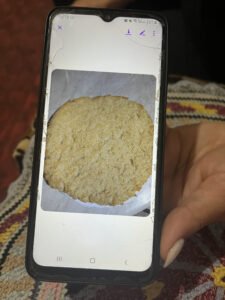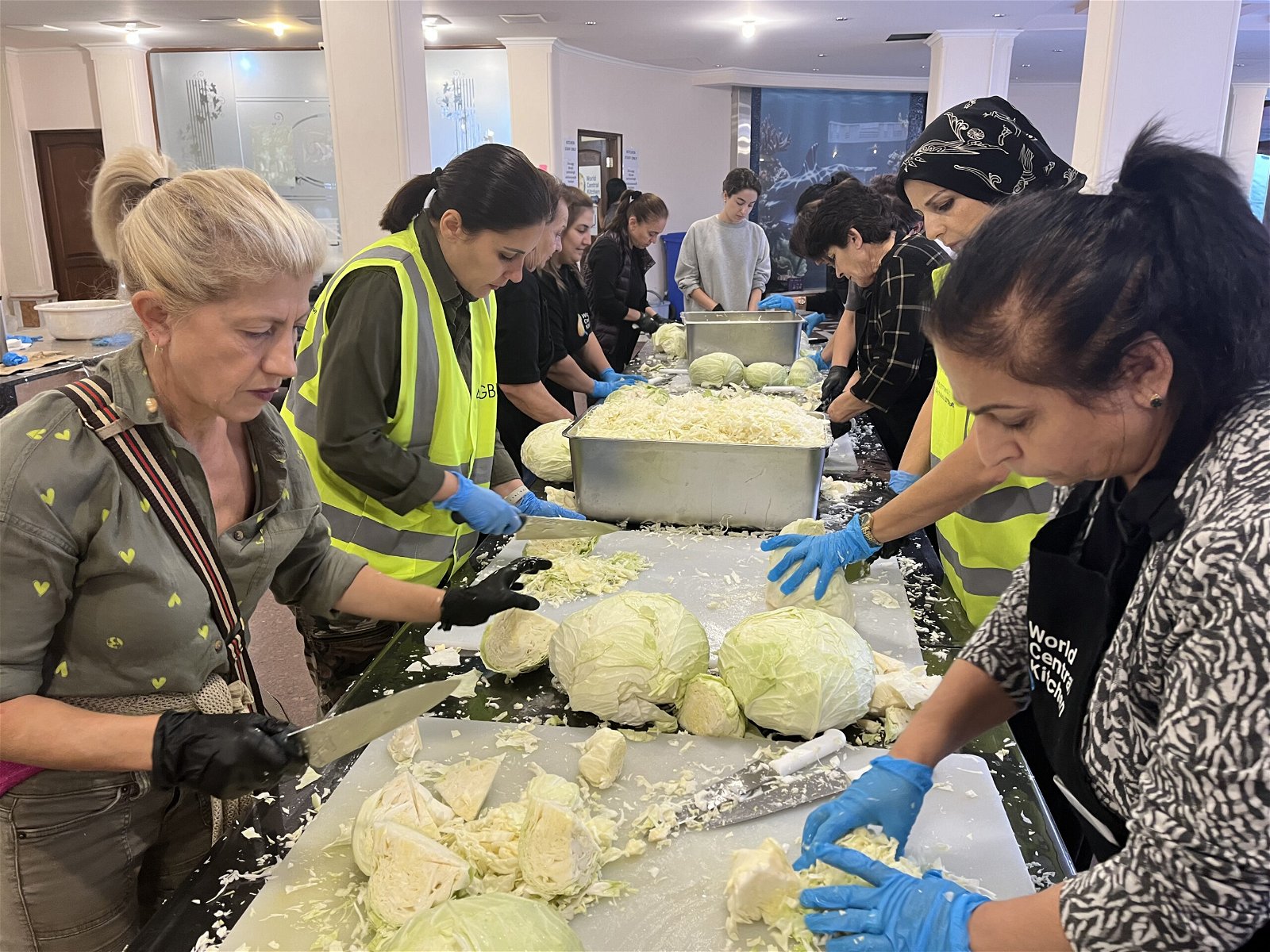This article is the third in a series about the fall of Artsakh, its humanitarian consequences and relief efforts, based on Lillian Avedian’s on-the-ground reporting from Armenia in October 2023.
On her final day in Artsakh, when virtually its entire population had fled following a brutal attack by Azerbaijan, Kristin Balayan prepared a meal for the employees of her cafe. She ordered them to deliver some bread she had baked to the local hospital, and in their absence, she cooked in her cafe Tumanyan in Artsakh’s capital city Stepanakert for the last time. The meal had the somber, religious quality of the last supper, and the group offered toasts and broke bread as they prepared to leave behind their beloved cafe to an unknown fate. Balayan left the table settings from that final meal intact, in hopes that if Azerbaijani soldiers entered the cafe and saw a table filled with plates and food, they would not destroy it.
Balayan was among the few to stay in Stepanakert until September 29, 10 days after Azerbaijan launched its full scale assault on Artsakh, or Nagorno-Karabakh, triggering the mass displacement of the region’s Armenians. She prepared free meals for those who remained. After nine months of a devastating blockade, food was scarce, so she got creative. Lacking flour, she baked lavash bread using bran, or “what we feed pigs,” as she disdainfully called it. People donated whatever food they had left in their pantries–“half a bottle of olive oil, some sugar, some noodles,” Balayan recounted–to her cafe before embarking on the long drive to Armenia.
Balayan’s story is representative of Artsakh’s Armenian women, who learned to stretch their resourcefulness as cooks to its limits under blockade. In times of crisis, the responsibility of adapting to new social and financial challenges in order to protect the health and wellbeing of the family often falls on women, who traditionally are the homemakers and family caretakers. They become problem solvers, crafting solutions with minimal material resources besides their own creativity and care. Following the fall of Artsakh to Azerbaijan and the refugee crisis, Armenian women have also adopted the roles of humanitarian aid workers, continuing to utilize their skills to feed and sustain their communities.
From September 19-20, Azerbaijan launched an assault on Artsakh to capture the territory by force. The de facto Armenian authorities, which had governed the region since the first Artsakh war in the 1990s, were forced to agree to disband and disarm the Artsakh Defense Army. Within a week, about 100,000 people, virtually the region’s entire Armenian population, fled to Armenia. The attack followed a nine-month blockade imposed by Azerbaijan that deprived Artsakh of much of its food supply and basic goods. By the time of the attack, fresh produce, dry goods, fuel, medicine and hygiene products were almost nonexistent. Armenia now faces the humanitarian challenges of meeting the basic needs of the Artsakh refugees and securing long-term housing, employment and social services for the traumatized population.

Faced with the impossible task of feeding their families under a blockade, Artsakh’s women created solutions, crafting recipes with whatever fell into their hands. They made coffee, Armenians’ drink of choice that is always offered to guests, by grinding barley and combining it with salt. Each household developed its own recipe for baking bread, another staple of the Armenian diet, without flour. One woman, the 36-year-old mother of teenagers Ani and Babken, showed me a picture of a recipe she invented, combining rice with yeast and salt to mimic the consistency of bread. “It’s tiring and stressful, when your hands are empty, and your children are hungry and ask for food, wondering what I will give them,” she said.
In the latter months of the blockade, when food and basic necessities were especially scarce, the government distributed vouchers for procuring bread. People stood in line for hours, sometimes well past midnight, to take a couple of pieces of bread home to their families. On extremely hot summer days, people, especially children and the elderly, frequently fainted while waiting in long lines.
The mother of young children Agnessa and Sashka invented ersatz laundry detergent by baking bars of soap until they reached the consistency of jelly and combining them with salt. “We don’t know if our clothes were washed or not,” she chuckled. The young mother is full of jokes. She poked fun at the absurd, previously unimaginable steps her family was forced to adopt in order to survive. It appeared to me as her mechanism to cope with the unrelenting stress of the upheavals and uncertainty of the past year.
She filled my lap with vouchers, featuring brightly colored images of fruit, vegetables and dry foods. The government distributed the vouchers for people to obtain limited quantities of food from the state supply. She never got to use the vouchers, because there was no food left to procure with them. She kept the small, square pieces of paper, because her children enjoy playing with the vivid images. “This is vermicelli. This is rice,” she counted, laughing as she held up the vouchers one by one. “We would look at the vouchers and get full. That’s how we lived. We lived through photos. We lived by tricking ourselves.”
Just like their mother, Agnessa and Sashka were quick to smile. Sashka sprinted around the room, his laughter echoing off of the high ceilings. I wondered whether their mother’s humor and capacity for imagination had protected them from grasping the difficulties facing their family and absorbing stress and grief.
“We would look at the vouchers and get full. That’s how we lived. We lived through photos. We lived by tricking ourselves.”
I met the family at the shelter of the Goris Development Foundation, a nonprofit that empowers women to find work and engage in public life. The organization has turned a large room, reminiscent of a gym or a banquet hall, into a shelter for displaced people from Artsakh. I sat cross-legged on the floor, in the middle of a cluster of beds, where women gathered to sit and speak with me. Agnessa approached me every few minutes with a drawing made of colored pencils or a card game, asking to play. As I was leaving, she gave me three presents: a scribbled drawing, a pencil and a plastic Easter egg concealing a walnut.
Ruzanna Torozyan, executive director of the foundation, warned that the displaced Armenians of Artsakh are struggling with severe health issues due to the lack of nutritious food during the blockade. This was exacerbated by limited access to doctors or medical services, since the resources of hospitals and medical institutions were depleted by the absence of medicine, supplies and fuel. She advised that medical experts should conduct research in the coming months to determine the health needs of the displaced population.
Several of the Armenians from Artsakh I met told me that Russian peacekeepers delivered food to Artsakh from Armenia during the blockade and sold it to the local population at higher prices. Following the end of the 2020 Artsakh War, a Russian peacekeeping contingent was deployed to Artsakh. During the blockade, peacekeepers sold a kilogram of sugar for 5,000 drams, about $12 USD, to the local Armenian population. Bottles of olive oil were sold between 5,000-10,000 drams each, up to $25 USD. A pack of cigarettes cost 15,000 drams, or $37 USD. Ani and Babken’s mom told me that a pack of cigarettes is usually sold for 120 drams. “The peacekeepers made good money,” she scoffed.
During periods of upheaval and uncertainty, women, who according to traditional social norms are looked to as the pillars of the family, draw on immense reserves of creativity and resourcefulness to keep their families alive. The women of Artsakh, in addition to the standard expectations of cooking, cleaning and running the household, carried the added burden and responsibility of learning to prepare food, while their home was under the grip of an unrelenting blockade on food and supplies. Their work multiplied, while their capacity for problem solving and invention was on full display.
To keep her cafe running, Balayan relied on one of the rare foods in easy supply that grows abundantly in Artsakh – chickpeas. She made hummus the centerpiece of Tumanyan’s menu, which she blended without the costly olive oil. She mixed jam with bran to bake cookies without sugar or flour. “Throughout the blockade, our closest clients would knock on the door and enter. They called us mom and dad. We were like family,” Balayan recalled.
Balayan’s qualifications are endless – in addition to establishing a cafe, she is also the founder of MilaGri, a foundation that supports children with special needs. She opened Tumanyan to use her skills as a home chef for her husband and two children to raise funds to launch a kindergarten. She also held sessions at Tumanyan for kids with special needs to connect with psychologists, speech therapists and rehabilitation services.
Balayan carries her immense love and longing for her abandoned cafe. “Our most expensive loss is the soul we put into the cafe,” she reflected. She hopes to open a similar cafe in Yerevan, with the same layout – a lush yard with canopies for outdoor seating where she can host community events and educational services for children. Her loyal clients have been pressing her to open a new cafe. “They keep asking me, when are you going to make hummus again?” she shared with a laugh.
While she is still grieving Tumanyan, Balayan has drawn on her endless reserve of resourcefulness and resilience to commence work in Armenia. She has been working for the World Central Kitchen, an international organization that provides hot meals in the aftermath of humanitarian crises. When I met her at the World Central Kitchen operation at the Armenian General Benevolent Union headquarters in Yerevan, she had been working since six in the morning. “I can’t rest. If I don’t work, I’ll go crazy. A normal person would go crazy in these circumstances, so we’re not normal,” she said wryly.
World Central Kitchen has recruited 18 women from Artsakh, including Balayan, to work for their operation to prepare and deliver hot food to displaced people from Artsakh living in Armenia. Globally renowned chef and restaurateur Aline Kamakian has been in Armenia since the end of September as one of the leaders of the operation. She and the women from Artsakh share a common bond – in the midst of chaos and destruction, they learned how to cook food with little means, and they used those skills in service of their communities.

Kamakian’s Lebanon-based Armenian restaurant Mayrig was destroyed by the devastating Beirut blast in August 2020. She rapidly mobilized her staff to rebuild the beloved restaurant and prepare thousands of free hot meals for Beirut’s residents. “I cooked with the leftovers of Mayrig restaurant. With the wood that was broken, I made a fire. We didn’t have plates. We were in a situation where there was nothing,” Kamakian said.
Whether cooking free meals after a disastrous explosion or mass displacement, or inventing recipes under blockade, Armenians have learned to cook with limited resources and immense creativity. Armenian women have been the centerpiece of this project, keeping their families and communities alive in their roles as home chefs, restaurateurs or aid workers.
This theme is woven throughout Armenian history. Kamakian’s grandmother was eight years old when she left Musa Ler, the site of famed resistance against the genocidal Ottoman army in 1915. Exiled from her ancestral lands, she relied on her memories of the smells and tastes of the comfort dishes she grew up with to recreate the recipes of the traditional cuisine of Musa Ler. In Kamakian’s words: “We’ve become creators of food from nothing.”



Be the first to comment